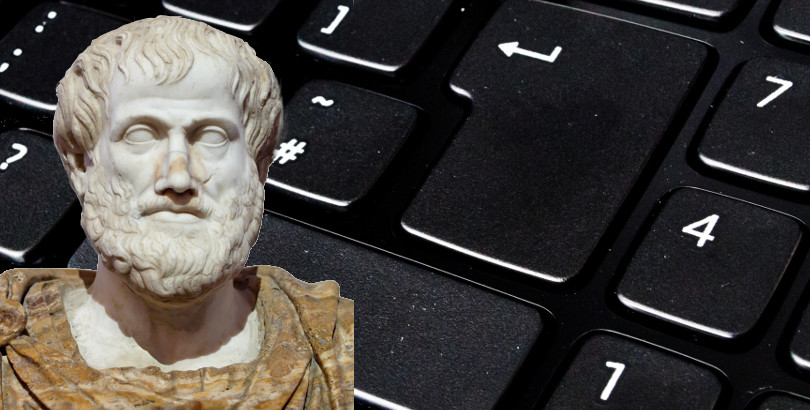One of the questions I like to indulge, from time to time, is “what would Aristotle’s reaction be to some fixture of modern life?” This week I decided to ponder what the famous Macedonian would say about the use of randomness, statistics, and probabilistic reasoning that pervades our daily existence.
On one hand, I think that he would be intrigued by the very way that randomness is built into nature and our interactions with her. Quantum mechanics has randomness at its very core. This type of randomness, sometimes referred to as aleatory (meaning depending on the dice) uncertainty, is (or at least seems to be) an inescapable facet of how matter works at its most basic level. The outcome of any experiment is probabilistic no matter how precisely controlled was the setup. I imagine the fascination and, perhaps, the disbelief that he would have displayed when first encountering the Heisenberg uncertainty principle. In fact, since I am fantasizing here, it would be really interesting to see these two great men sit down for lunch and a long philosophical discussion about the meaning of uncertainty and causality.
I also think that Aristotle would have quickly grasped how we apply uncertainty in our knowledge, sometimes referred to as epistemological uncertainty, to a host of important everyday activities.
I envision him nodding his head in approval to the sciences of chemistry, thermodynamics, and statistical mechanics. In each of these disciplines, the sheer amount of data needed to describe the motion of the individual atoms, molecules, or components is overwhelming, and one must sacrifice complete knowledge of the small in order to get good knowledge of the all. No doubt, the connection between information and entropy would consume much of his attention as he explored the combinatoric possibilities of very large numbers of objects.
Aristotle would also be at home in the how discipline of statistics and estimation theory. As a skeptic of the universal validity of the Platonic forms, he well knew the individual differences in development and form of everything on the Earth. I picture him exclaiming, with satisfaction, “Yes! That’s how it should be done,” when he saw how statistical estimation theory is applied to turning noisy measurements into adequate conclusions. All the modern applications, from quality control to data fitting, would have caught his fancy.
Computing application of randomness and uncertainty would also meet with his approval. Numerical techniques, such as the Monte Carlo method, that use random samples as a way of ferreting out details of a process would hold a particular fascination for him and I imagine him spending hours playing with cellular automata simulations, such as Conway’s game of life. Most of all, the growing consensus in the artificial intelligence community that uncertainty is the vital component to producing machines that make rational decisions would have been pure delight for the Philosopher.
All that said, I think Aristotle would recoil in horror with that one, very large, component of randomness in modern life – the public’s approach to the scientific study.
Everywhere we go we are confronted by a headline, radio broadcast, news report, or tweet that says some study performed somewhere has determined something. Often times the public, even that component that is highly educated, consumes these studies with little or no heed. Most are unaware of how these studies are performed and how weak the inferences (i.e., conclusions) actually are.
If Aristotle were sitting amongst us when the news of the latest study were to break, he would be the first to caution us to be clear in our thinking and skeptical of the results. As a logician, he would know the difficulty in inferring a cause from the observed effect. And as a member of the Athenian polis, he would know better than we the various conflicting political agendas that drive people to various conclusions.
But the most grievous complaint that Aristotle would level against modern scientific studies would come only after he returned to the academy to see just how ‘the sausage is made’. He would be shocked and repulsed by the bastardization of the academic process. Not because of the political pressures and the conflicts of interest due to funding or the lack of it. No, he would be repulsed with how little regard our institutions of higher learning have for the concept of critical thinking.
To be a skeptic, to doubt a conclusion, to question and probe are no longer virtues (in the strictest Aristotelian sense). These traits brand their bearer not as a philosopher but as dullard or, worse, a denier. Graduate students, post docs, and professors worldwide are increasingly drifting further away from intellectual integrity. It is enough, they say, to find a positive or negative correlation in some data, perform a hypothesis test, and publish a result (see, e.g., the critiques leveled by Michael Starbird in Meaning from Data: Statistics Made Clear). Damn critical thinking and the discomfort that it brings they say. Aristotle, or course, would say different.
